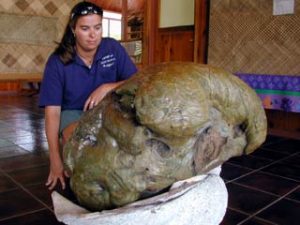I dunno what the safety concerns might be if waxy whale vomit, known as ambergris, is incorporated as a flavoring for food; the vomit is largely used to create musk fragrances for perfumes. According to Deccan Herald, 80kg of the vomit treasure, worth $2.5 million was found by Omani fishers.
Khalid Al Sinani, who is in his late 30s, found floating “whale vomit” on the shores of Qurayat province last week.
‘Whale vomit’ or Ambergris is a very costly wax that originates as a secretion in the intestines of the sperm whale. It can be found floating in tropical seas and is used in manufacture of perfume.
After 20 years of hand-to-mouth life as a fisherman, Khalid’s childhood dream of winning the sea lottery came true on the morning of October 30 when he, along with two of his friends, saw a mass of ambergris floating on the sea, releasing a nasty smell.
“We used a rope to collect it and carry it inside the boat,” Khalid was quoted as saying by the Times of Oman.
“I was told earlier that ambergris has an icky smell, but after a couple of days it imparts a pleasant scent. We rushed back to the beach with joy and happiness,” he said.
After keeping his valuable harvest in a box, he called some experts to identify the material.
“After we made sure it was ambergris, we started cutting it in order to dry and sell it later,” Khalid said.
“I’ll wait to see how this sale will go and later I’ll think of changing my career and enter the real-estate sector to live a better life,” he said.
